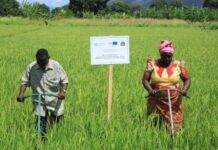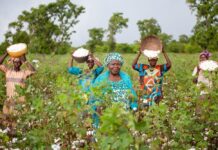World Animal Protection applauds Uganda Wildlife Conservation Education Centre for rewilding parrots caught up in the cruel wildlife trade.
Edith Kabesiime, the Wildlife Campaign Manager at World Animal Protection said, “We applaud Uganda Wildlife Conservation Education Centre for doing the only right thing – of rehabilitating and releasing the birds back into the wild where they rightly belong. African grey Parrots are the most traded wildlife species to feed the inhumane pet trade industry. Their capture from the wild is torturous, painful, and disgusting to say the least.”
In April 2022, 122 parrots were seized from traffickers operating near Bunagana, located at the border of Uganda and the Democratic Republic of Congo (DRC). Acting on intelligence information received about a suspected trafficker from Kinshasha, the enforcement agencies swiftly intervened to protect the birds from the clutches of illegal wildlife trade. Three (3) were dead, and the remaining 119 were taken to Uganda Wildlife Conservation Education Centre for close monitoring and rehabilitation before being released to the wild.
Last week, fifty-five (55) of the119 parrots were flagged off from Uganda Wildlife Conservation Education Centre to be released to the wild at Kibale National Park in Western Uganda. This momentous rescue and release of the parrots highlights the urgent need to end wildlife trafficking and strengthen enforcement measures.
In 2016, the Parties to the Convention on International Trade in Endangered Species (CITES) outlawed the international trade in African Grey Parrots. However, trade is still allowed for the parrots raised in CITES registered captive facilities. Because of the complexity of wildlife crime, experts have cautioned that allowing captive breeding of CITES Appendix 1 species, offers no conservation benefits, and only fuels the poaching of wild species for breeding farms.
“It is crucial that UWEC releases back into the wild the remaining sixty-four birds they are still holding in captivity and should never consider or encourage commercial captive breeding for the local and international pet market. Commercial wildlife breeding, legal or illegal is inherently cruel, serves no known conservation benefits and is a serious public health risk as birds and wildlife in general can be a source of dangerous zoonotic diseases.” Said Edith Kabesiime.
As World Animal Protection, we believe that African Grey parrots and all wild animals belong to the wild and nature offers the optimum conditions for them to thrive and repopulate. All we need is concerted efforts to preserve and protect their natural habitats. We call upon governments, organizations, and individuals to take immediate action and unite against wildlife crime and commercial captive wildlife breeding. It is our shared responsibility to protect our wildlife and allow them to thrive in their natural environments.







